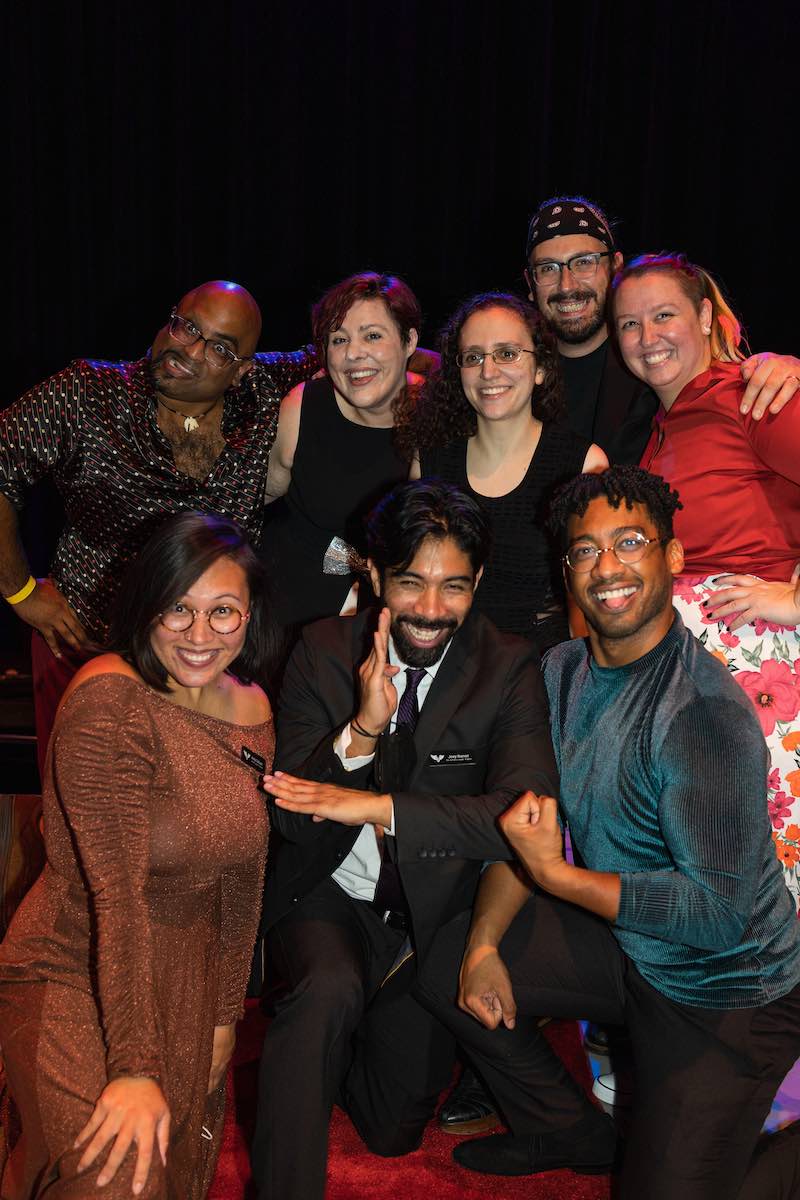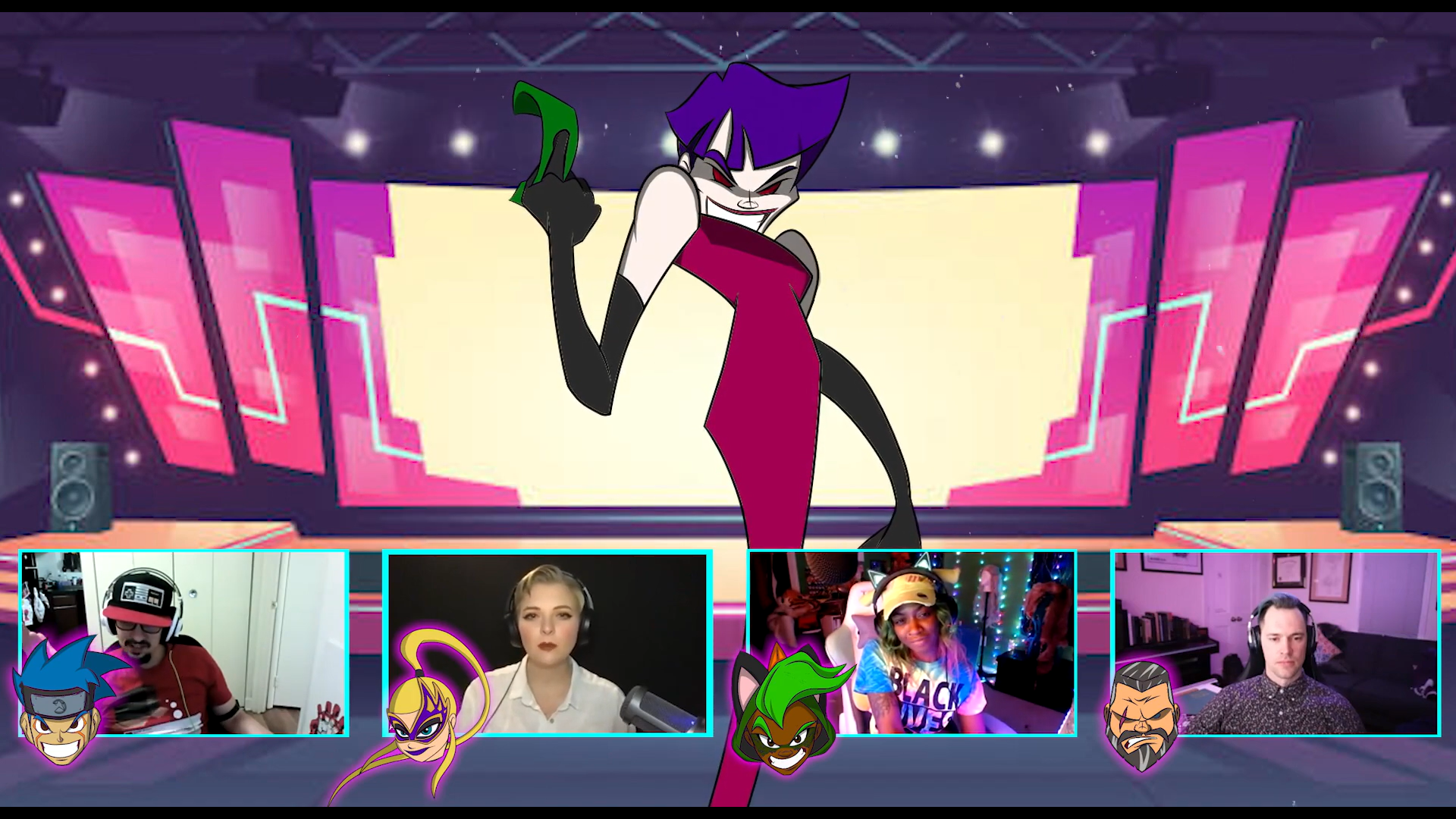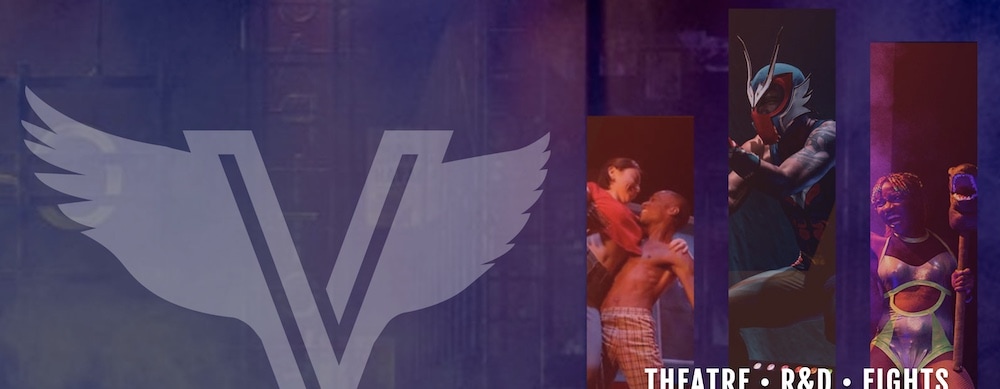Spend a little time with the leadership team behind Flying V Theatre Company and you’ll come to the conclusion that every one of us has a little nerd inside. Flying V is where you can let that out.
The 11-year-old organization calls itself “your local indie theater” and offers a creative space for the nerd in all of us. Based in Montgomery County, Maryland, the company is divided into three “wings”: staged theater performances, research and development, and fights — as in wrestling matches and other feats of physical competition. Together, these distinct wings push the boundaries of what constitutes storytelling, building an organization that is always searching for out-of-the-box ways to tell stories — often eschewing traditional theatrical conventions to experiment with new models.

In 2020, company founder Jason Schlafstein came under fire for his alleged history of sexual harassment. Following Schlafstein’s termination, the remaining collaborative creatives, known for producing quirky ensemble-driven productions, regrouped under a shared leadership model. The team began to revamp and strategize for Flying V’s future, juggling both the absence of the organization’s founder and the onset of the 18-month closure of live theater brought on by COVID.
What emerged from this time of uncertainty was a reconceived leadership model with an executive director and a team of “artistic leaders” who manage the organization’s three wings. This structure allows each team leader to focus on their expertise while also collaborating, contributing, or stepping back when necessary so processes and projects can move forward. Each artistic lead signs on for a three-year tenure, which they can renew if they choose. In the coming years, the team will shift, by design, and new leaders will emerge and likely steer Flying V in new directions, allowing the organization to explore performance in traditional and experimental ways both in person and in the digital space.
navi (one name only) serves as the artistic lead for the R&D Wing. They see the organization’s shared leadership model as a symbiotic path to continual renewal. “What is really exciting about the model we are building and what we spend a lot of every day stressing and working through is laying the foundation for a company that grows and evolves beyond our time with it. Embracing who you are and where you are in space and time is part of the nerd identity. It transcends us. I would love to come to a Flying V show in 10 years, when I’m no longer a leader of the company, and excitedly experience what the next generation of nerds in charge have to say.”
“Flying V has gone through a huge transformation,” said Executive Director Katherine Offutt when reflecting on the organization’s rebirth post-Schlafstein. “We now consider ourselves a performing arts organization. While we do still have a focus on theater, we decided that we are not a theater that happens to do other things. We are a company that does theater and other things.”
But everything the organization does focuses primarily on storytelling, Offutt added. “There are a lot of different ways stories manifest, and since we focus our stories on nerd and pop culture, that’s the aesthetic thread that pulls Flying V together. We don’t always know what we’re going to do, but if you see it, you’ll know Flying V did it.”
Offutt came to the organization in April 2020, while Schlafstein still led the company, hired to put an infrastructure in place at a time of rapid growth. Then shift happened — with Schlafstein’s firing — and her managing role became an unexpected executive directorship.
The challenge of carrying the organization forward provided the opportunity to reshape it into whatever the new leadership team wanted it to be. That meant examining everything, from questioning the big concepts of what a new Flying V would look like and whether or not to keep the organization’s original branding to the minutiae of day-to-day processes like scheduling rehearsals to end well before the Metro closes and creating lifestyle-friendly work hours.
The team made a conscious decision to keep the organization’s name. “When we were redeveloping,” said Tim German, an artistic co-lead for the Flying V Fights Wing, “we had the option to change the name. We chose to stick with it because it is a brand that is recognized by the community and they associate it more with an aesthetic than any one individual.”
On the origin of the name Flying V, Offutt said she had asked the founder, who explained it was a pop culture reference to the 1990s Disney hockey movie The Mighty Ducks. Nineties pop culture and nerd culture nostalgia had been a mainstay of the company, which has successfully drawn in a significant cohort of millennial audiences.
So, what the heck is nerd culture?
While it’s easy to associate nerd culture with comic books, Dungeons and Dragons, and video gaming fans, navi defines nerd culture more broadly: “The root of nerd culture is being so passionately committed to and interested in a niche topic or subject that you actively seek other people like that and you take pride in celebrating” whatever activity you love, from musical theater to cosplay to wrestling to collecting trading cards.

Roll, James Finley. Joey Ibanez, editor and graphic design.
Flying V’s theater artistic lead Kelly Colburn describes herself as a multidisciplinary artist who wears many hats as producer, director, designer, and deviser. But she never thought she was a nerd until she came to Flying V: “What excites me about nerd culture as someone who never really identified as a nerd until I turned 30 — I’m 33 now — is that this idea of being a nerd is really rooted in the community. It is built around the love of these things,” whatever they may be. She added that the nerd community is less attentive to following and observing the art than it is about “talking about it at length and creating relationships, not just because of the art, but in relation to and then outside of the art.”
The nerdisphere of Flying V
Flying V’s Theatre Wing, the group’s most established arm, features traditional plays as well as experimental experiences. Coming up on January 28 and 29, 2023, Flying V’s Theatre Wing will be hosting the creative team of Vanishing Girl, a brand-new musical, with a book by Hope Villanueva and music and lyrics by William Yanesh.
“In the Theatre Wing,” Colburn said, “everything is all about storytelling. So when you come to see a theater show at Flying V, you may get that traditional ‘well-made play,’ but you may also come and see an experimental experience. Vanishing Girl is that more traditional musical theater model. You will get a sneak peek of a musical in development.”
On the R&D track, Flying V offered Showburger’s Comedy Test Kitchen on November 14. Helmed by a pair of comedy pros, this event inaugurated a monthly drop-in “Comedy Test Kitchen.” Sketch writers, stand-up comics, improvisers, and performers were invited to test out their latest bits at the Silver Spring Black Box for a group of like-minded creatives and contributors.
German, a pro wrestler, works with Joey Ibanez on wrestling and fight shows. “We facilitate stage combat and professional wrestling events and we’ve had a combat gym where folks came through to get certified,” he said. “Joey and I like to say that fights [as Flying V stages them] are about how stories can be told purely physically — with violence, intimacy, movement, whatever. Obviously, wrestling is a big part of that because it’s a very specific physical form of storytelling.”
And if the thought of on-stage violence sounds like a turn-off, German shared his point of view. “Defensive professional wrestling is a uniquely American form of storytelling created to mimic sport. But it’s also high melodrama. The characters, and the audience interaction, are more akin to how Shakespeare was performed in the Globe Theatre.”

He also offered this for those who dislike physical violence on stage: “Wrestling is staged. It’s choreographed. I’d never say that wrestling is the end all be all of physical storytelling, I’d only ask that they try watching our wrestling with an open mind.”
Sometimes, Flying V’s various pursuits combine into even more experimental artistic explorations. For example, on December 3, “Flying V vs. Super Art Fight” will offer up pro wrestling and a live art competition simultaneously. Joining the staged wrestlers will be a group of artists battling one another on canvas, a live mash-up of brushstrokes and smackdowns where anything — and everything — could happen.
As for the R&D Wing, that’s where navi excels. “The R&D department explores and tests the boundaries of performance technology and nontraditional spaces to tell stories. Again, it all comes back to telling stories,” they said. “I’m excited to explore storytelling in nontraditional theatrical ways. While wrestling is a specific example of that, in my world it lives in the combination of the digital and the physical, but also in music culture, burlesque culture, nerd culture.”
Previous projects navi has helmed include an original podcast series featuring local playwrights, audio designers, and performers. “We’re in pre-production of series three right now,” they said, “using all original scripted audio fiction with voice actors, original music, and sound design.” Plans for June 2023 include local cosplay and burlesque performers like Flying V favorite Maki Roll, an area award-winning burlesque and cosplay performer.
In the digital space, navi runs a server on Discord — a growing social platform popular with gamers that allows for the creation of curated communities. This burgeoning subset of nerd culture allows fans with specific like-minded “nerdy” interests to gather for private discussions. Navi likens the growing community opportunities in the digital world to the shift from Walmart-like big box retailers to local home-grown businesses, adding, “It’s important to get ahead of the curve on that.” Other experimental projects have included a live show called .DOCS that was entirely text-based and took place in chat rooms, through text messages, and in shared Google documents where actors were typing and the audience was reading in real time. navi and the R&D Wing have spent the past two years figuring out how to tell a story in that format.
Flying into the future

“The organization is made up of people and not one individual,” Colburn said. “That allows us to continue conversations about pop and nerd culture. It allows us to bring in new perspectives. It allows any one of us to leave after three, five, and six years and to know that whoever comes in next will be bringing a fresh, new, delightful perspective to what it is to be a nerd in the world today.”
For information on Flying V Theatre Company, visit flyingvtheatre.com.
SEE ALSO: DC Theater Arts’ recent coverage of Flying V.
About the Wendi Winters Memorial Series: DC Theater Arts has partnered with the Wendi Winters Memorial Foundation to honor the life and work of Wendi Winters, the DC Theater Arts writer who died in the Capital Gazette shooting in Annapolis, Maryland, on June 28, 2018. To honor Wendi’s legacy, the Wendi Winters Memorial Foundation has funded the Wendi Winters Memorial Series, monthly articles to be produced by DC Theater Arts to bring attention to theater companies and theater practitioners in our region who engage in exemplary work that makes our community a better place. The centerpiece of these articles is a series we are calling “The Companies We Keep,” articles offering an in-depth look at one local theater company each month. In these times of division and conflict, DC Theater Arts chooses to celebrate those who do good.
For more information on DC Theater Arts’ Wendi Winters Memorial Series, check out this article graciously published by our friends at District Fray Magazine.






